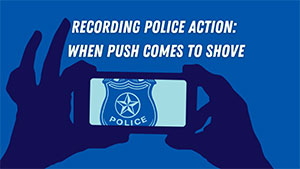Recording Police Action: When Push Comes To Shove
When attorney Shaun Jacobs arrived home from work one evening in March 2019, he could not have imagined he would soon be spending 26 hours detained in a jail cell.
On the evening in question, police had set up a roadblock outside his house in Kempton Park. Jacobs approached the officers, complaining that the roadblock was causing an unreasonable disturbance. He asked if they could relocate it to a spot in front of some vacant land a little further down the road.
They ignored him.
He then asked for their details, which is when things started to escalate.
An officer, later identified as Koahela George, put both hands on Jacobs’ chest and pushed him, telling him to go inside his house or risk arrest.
Jacobs did as he was asked, but only long enough to put down his things before heading back out, cellphone in hand. He planned to record the roadblock so he could lay a complaint to the authorities about its location.
He stayed within the boundaries of his property and wasn’t rude or aggressive to the officers. But as soon as they noticed he was recording the scene – particularly their vehicle – he was arrested, without his rights being explained or any explanation given as to the offence he had allegedly committed.
He spent the next 26 hours in detention.
Once released, Jacobs wasted no time. He started procedures to take the matter to court, suing both the minister of police and the Ekurhuleni metro police, saying his arrest and detention were unlawful and violated his constitutional rights.
According to a report in iol.co.za, the prosecutor later tried to intimidate Jacobs and his attorney during a mediation session, saying that the case was similar to that of Vicky Momberg ‘s racism accusation, which resulted in a sentence of three years in prison. He allegedly intimated that a payment of R20 000 would make the matter go away.
Jacobs refused, and once the prosecutor saw the video Jacobs had recorded, he dropped the charges.
After six long years, in June this year, Gauteng High Court judge Mpostoli Twala ruled that Jacobs’ arrest and detention were indeed unjustified and unlawful. He ordered suspended Police Minister Senzo Mchunu, and the Ekurhuleni Metropolitan Police Department, to pay R100 000 and R150 000 respectively in compensation.
The financial outcome, however, is not the most important takeaway here.
The landmark ruling sends a significant message: All South Africans, not just accredited journalists, have the right to question – and openly record – public police conduct.
The one caveat is that they don’t physically obstruct police operations, as that constitutes an offence.
In his judgment, Judge Twala said South African citizens are entitled to ask questions – and entitled to explanations – from law enforcement officers in respect of their conduct.
“That cannot be regarded as interference with the execution of their lawful duties,” he said.
“There is no prohibition that prevents a private person from recording a member [of the police] while the member is on duty or exercising any power or duty as a police official in public,” he explained. “Arrest under these circumstances will be unlawful.”
Despite the timing of the announcement, this is not new legislation.
Under the Criminal Procedure Act 51 of 1977 and the National Road Traffic Act 93 of 1996, police officers may question individuals or conduct searches if they suspect a crime has been committed. This applies if you are stopped at a roadblock or approached in any other context.
If this happens, you are legally entitled to make reasonable inquiries about why you’re being questioned or searched. This does NOT amount to interfering with police duties. You are within your rights to request clarity, and you may also record both your questions and the officers’ answers.
These recordings can serve as valuable evidence in disputes about police conduct – especially if you believe they acted unlawfully.
In addition, the Regulation of Interception of Communications and Provision of Communication-Related Information Act 70 of 2002 (RICA) clearly states that if you are a party to a conversation or incident, you may record it, whether audio or video, without needing consent from the other party. ( The POPIA act is not purely consent-driven, and filming public officials in public spaces is usually always justifiable).
It’s also important to know that police officers may not simply demand your phone and/or delete your footage.
As with any search or seizure, and unless in exceptional circumstances, they need a warrant. If an officer does demand your phone, calmly ask whether you are being arrested, whether there is a warrant, or which exception they’re relying on.
Here are some other useful tips to remember when recording police officers:
- Keep your distance and don’t physically interfere – your right is to record, not obstruct.
- Calmly let the officer(s) know you’re recording them.
- Make sure your footage is secure – back up onto the Cloud and always use a screen lock.
Finally, if you are harassed, arrested, or assaulted for filming the police, seek prompt legal advice. You also have the option of lodging a complaint with the Independent Police Investigative Directorate (IPID). They have a toll-free national helpline.
There’s no doubt that the recent High Court decision is a huge step forward in ensuring healthy transparency and accountability for South Africa law enforcement. It would seem that, at last, the pendulum of fairness and justice is finally starting to swing back in the direction of everyday South African citizens.
Let’s hope this welcome trend continues.
